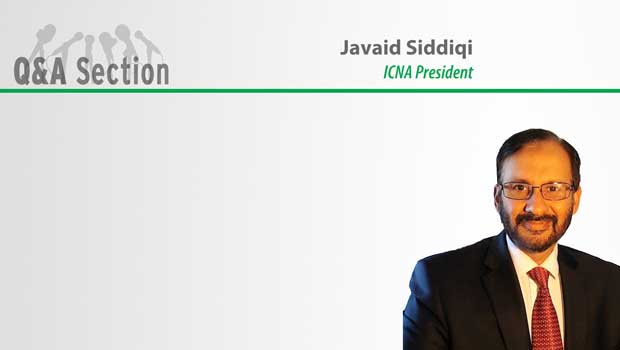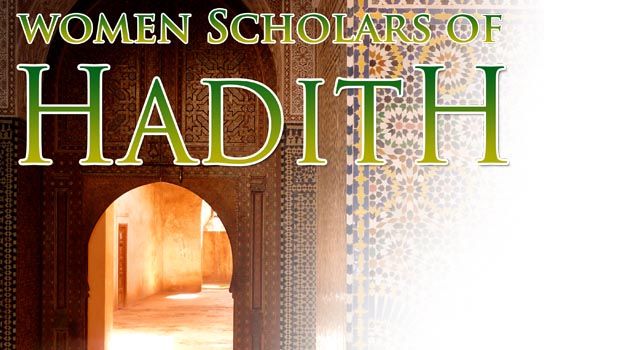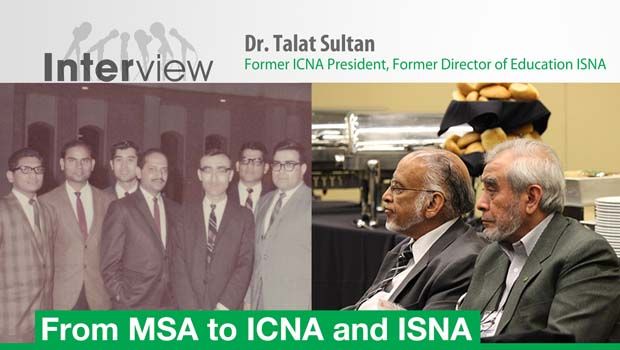The following interview with ICNA President Javaid Siddiqi was conducted by Imam Khalid Griggs. Dedicated to Islamic service
and dawah, he also serves as Chief Operating Officer for Helping Hand USA and previously held the
office of ICNA Vice President for Tarbiyah.
1. How were you first made aware of ICNA and what factors influenced you to become a member of its General Assembly (MGA)?
My parents have long been associated with the work of Islamic movements for decades. When my father migrated to the United States, one of his first efforts was to make contact with brothers who were active in Islamic activities and work in America. My formal introduction to ICNA was in the late 1990s. I was extremely impressed by the sense of brotherhood that existed among members of this organization and felt a deep connection to the work and its membership. I studied the charter and bylaws of the organization and worked very closely with members of ICNA’s General Assembly. ICNA’s mission and vision resonated clearly with the mission entrusted to the ummah of Muhammad (pbuh), which is, through education and service, inviting mankind to the worship of one God. The combination of these key factors played a central role in my decision to become an MGA of ICNA.
2. What have been some of your organizational responsibilities over the years? And, through the prism of these duties, what changes have you seen in the membership and support base of ICNA?
Over the years, I have served in a variety of leadership roles at the local, regional, and national levels. What I feel is important, though, and one of the most important and distinguishing features of the organization, is the practice of “not desiring or seeking leadership roles or positions.” This practice has been adopted in accordance with Islamic principles and teachings of the Prophet Muhammad (pbuh) to promote an environment of volunteerism and service to God and community. Members of the organization do not seek, and neither desire nor campaign, for leadership positions. Rather, members are nominated or elected based on their commitment to the cause, capability, experience, and skills. This model stands out in today’s cultural and political environment where campaigning and self-promotion by candidates is the norm. Once elected for any position, members mostly serve in volunteer positions and consider this as a religious duty, a responsibility for which they are accountable before God. I believe this Islamic model is a mature and moral alternative to the current mode of campaigning that is self-centered and often ruthless competition, dominated by mutual bashing by candidates.
Over the years, I have witnessed an always evolving, committed and enthusiastic membership base that subscribes to the vision and mission of the organization. It is exciting to see the expansion we are experiencing but feel much more can be done to share Islam with everyone in America. It is humbling to see the trust and support ICNA has received from the community at large. In the 1980s and ‘90s, the majority of the membership were immigrants to the United States; but in the last 20 years, young men and women who have been born and raised in America have joined the ranks of the organization. ICNA’s social service and relief projects created a perfect opportunity for Muslims who may not have identified themselves as religious-minded but saw service to humanity as a duty. So many became volunteers and supporters of these important projects. This is still a work in progress and we must do more to deepen our roots within the Muslim community. I’m confident that with the help of Allah and the dedication and sincerity of our brothers and sisters, we will be able to share the message of Islam, and its solutions to the challenges faced by humanity, to every corner of this continent.
3. To what degree do you think changes in the socio-political landscape of America have influenced the programmatic thrust, emphasis, and services of ICNA?
ICNA’s program and methodology are based upon the teachings of Quran and Sunnah of Prophet Muhammad (pbuh). I believe the similarities in the challenges faced by the early Muslims during the time of Prophet Muhammad (pbuh) and the Muslim community in America today provide an amazing blueprint for success. ICNA’s dawah projects, WhyIslam and Gainpeace, provide the backbone of dawah-related activities. These projects — through an online presence, a network of dedicated volunteers, highway billboards, 24/7 toll free hotlines, and publications — present the Muslim message and invitation to the truth and peace of Islam.
The rise in Islamophobia over the past decade, as well as the need to offer the Islamic narrative to social challenges in society, have provided the thrust to expedite ICNA’s efforts to be actively involved in the social justice movement and, hence, the birth of ICNA’s Council for Social Justice (CSJ). The council has established several areas of focus: family breakdown, structural racism, global injustice, hunger/poverty/inequality, injustice to indigenous people, Islamophobia, and unjust immigration policies. Similarly, the fight against hunger and poverty and Islam’s teachings about the rights of neighbors, the needy, and the poor in our communities propelled us to establish ICNA’s domestic relief efforts in the form of ICNA Relief. The work of ICNA Relief is one of the most beautiful manifestations of what Islam stands for, and clearly sends the message that Muslims care! We realize the tide of negative propaganda against Islam and Muslims has risen to unprecedented levels, but we truly feel that intensifying our efforts of outreach, through dawah and service, is the best way to educate our fellow Americans about Islam and its beautiful way of life. Our social service projects at home and abroad show that Muslims are active contributors to the well-being of people and societies. We feel the pain and suffering of humanity, and based on the teachings of Islam, continually strive to look beyond our own self-interests. Our social justice program is designed to bring awareness to all forms of injustice in society. The list is long.
4. In your opinion, has ICNA’s response to the needs of the larger Muslim community been sufficient?
Over the years, ICNA has launched projects designed to address the needs of every segment of the community and family. ICNA Sisters, an organization dedicated to women, has been busy transforming the lives of our mothers, sisters, wives, and daughters through education, organization, and service. Young Muslims (brothers and sisters) is organized to address the needs of our youth, starting at an early age, to provide a safe, educational, and enjoyable environment for their development.
In our recent Shura retreat in September, we took a pause to reflect on our past 50 years and evaluate our developing needs. It was apparent that despite our efforts, a lot more needs to be done to address the needs of the Muslim community. We can’t consider ourselves immune from the harmful aspects of the environment around us. The challenges of broken families, troubled marriages, divorce, drug abuse, and mental health issues are affecting the Muslim community in the same way the larger society is affected. I feel ICNA has done a great job creating model organizations to address a variety of challenges, but that’s not enough. We need everyone to participate in this effort. These challenges are bigger than one organization. So, for example, the existing availability of Muslim counselors or matrimonial services is not able to keep up with the demands. Complicating matters is that issues related to mental illness are often avoided in our communities due to cultural stigmas and, therefore, don’t receive appropriate attention. There is a dire need for many more Muslim mental health professionals. The time is long overdue for Muslims to forthrightly recognize these issues and brainstorm how best to address them. I’m confident with an integrated and unified approach these issues can be addressed, insha’Allah.
5. ICNA classifies itself as an integral part of the Islamic movement, not the only one. What mindset underlies this self-designation?
We feel that our role is to complement the efforts of many other Muslim organizations who seek to
provide leadership to the Muslim community. We recognize and appreciate the efforts of mainstream Muslim organizations who are providing leadership in this space and are committed to working with them in a cooperative manner, not in some kind of petty competition with them. We believe that our role is to unite the community, and therefore we seek partnerships, staying far away from an isolationist mentality, for we are clear that we do not “know it all.”
Our mission and vision outline what we believe in and how we intend to accomplish that. Every individual who subscribes to these principles is our brother or sister in this journey. We are confident that every Muslim who believes in Allah and the final Prophet will see our vision and mission as their own vision and mission. We believe that Quran and Sunnah are the two primary sources that provide a holistic view for every aspect of life. We fully subscribe to the calling of Quran to “believe in Allah and do good deeds.” ICNA feels that its efforts and projects must provide an opportunity for every member to learn and gain knowledge while exercising that knowledge through action and activism.
6. What is ICNA’s relationship to the global Islamic movement and how has that changed, if at all, over the years?
We continue to feel that our organization is an integral part of the global Islamic movement. We aim to collaborate, cooperate, and share. The changing socio-political climate around the world and realities on the ground have hampered and slowed down these efforts to collaborate and cooperate. I believe that the changing dynamics around us have forced Islamic movements to redefine themselves to address their local needs. I wish we could have established closer relations and more practical exchange of ideas and solutions. Leadership visits do happen from time to time but not in systematic and effective ways.
7. This year, 2018, commemorates 50 years of ICNA’s continuous organizational existence. In your opinion, what have been some of the most significant accomplishments and disappointments during this period?
I would like to thank Allah (SWT) who has allowed us to reach this milestone. We are humbled and grateful. First let me mention a couple of areas for improvement. The establishment of professional educational institutions has been an area in which we have not yet been able to make any significant progress. There is a demonstrable need for an educational institution of higher Islamic learning for our youth and adults, but we have not yet found a workable means to achieve this. In recent times, more organizations have joined the efforts to address this need and meet this challenge, but options right now remain limited. Also, ICNA has been slow in developing content for North America in the various local languages. I feel we have a lot of work to do in this area.
As to significant accomplishments, in addition to the projects that ICNA has launched over the years, we feel that ICNA has been able to create different organizational models. For example, in dawah, we have learned tremendously over the years and have successfully established “the needs” of “dawah” and how to address them. Similarly, our conventions continue to grow year after year, alhamdullilah. I feel, we have been able to create a model for how and what to address through these conventions. As to social services in this country, I’m thankful to Allah (SWT) for allowing us to establish a good working model for serving the society and providing relief and support wherever it is needed. Coming to understand in comprehensive ways what is needed and how to best address these needs has been part of the ever-expanding domain of knowledge we have gained over the years. So, when I look at the past 50 years, I feel we have made a lot of progress. At the same time, we are dedicated to continual growth and
improvement, with the help of Allah (SWT).






